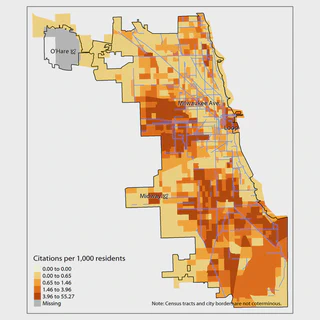Biking Where Black: Connecting Transportation Planning and Infrastructure to Disproportionate Policing
Sep 1, 2021·
 ·
0 min read
·
0 min read
Jesus M. Barajas
 Distribution of sidewalk cycling tickets in Chicago, 2017–2019
Distribution of sidewalk cycling tickets in Chicago, 2017–2019
Abstract
This study asks whether deficiencies in transportation are associated with disproportionate policing in Chicago using the case of cycling. I examine how the number of bicycle citations issued per street segment are influenced by the availability of bicycle facilities and street characteristics, controlling for crash incidence, police presence, and neighborhood characteristics. Tickets were issued 8 times more often per capita in majority Black tracts and 3 times more often in majority Latino tracts compared to majority white tracts. More tickets were issued on major streets, but up to 85% fewer were issued when those streets had bike facilities, which were less prevalent in Black and Latino neighborhoods. Tickets were not associated with bicycle injury-crashes and inversely associated with vehicle injury-crashes. Infrastructure inequities compound the effects of racially-biased policing in the context of transportation safety strategies. Remedies include the removal of traffic enforcement from safe systems strategies and equitable investment in cycling.
Type
Publication
Transportation Research Part D: Transport and Environment